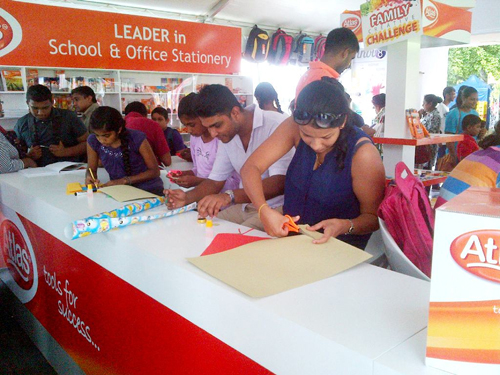Bookmark in a book market
View(s):
File picture of an earlier Colombo International Book Fair event
I came across news that Anne Krueger has published a new book titled “International Trade: What Everyone Needs to Know”. I don’t think the author is a familiar name to our readers. Anne Krueger has been a pioneering economist who has worked largely in the area of “international trade” for more than 60 years, I believe. For that matter she has been one of the leading economists who contributed to the decisive shift in world development thinking and practice from “protectionist regimes” to “liberalised regimes” in developing countries, which took place during the 1970s – 1990s.
I used to read her research publications in detail during my postgraduate studies in the 1990s. Therefore, I was fascinated by the news about her new book on international trade; I wanted to get a copy of it immediately for our library.
The procedures
I checked with the university library. “What is the procedure to buy a new international book to our library which has been published recently in the US?”
I learnt the procedure: Universities have to follow the National Procurement Guidelines of Sri Lanka when purchasing books. As stipulated in the guidelines, the books can be purchased either from direct publishers and exclusive distributors or from the registered suppliers calling for quotations. However, many foreign publishers do not accept orders for a few titles, the available option is to call for quotations from suppliers.
Based on the value of the books, the library has to get the approval from the Technical Evaluation Committee (TEC) and Departmental Procurement Committee (DPC) of the university before placing the order for the books. I was told that this procedure may take a couple of months.
I had a question: “If I want to buy the book immediately how do I do it?” With a reasonable justification of the urgency, the book may be brought down by air freight, but the cost would be much higher.
I thought to myself that the book is about $18 only; about 3,500 Sri Lankan rupees. I was not sure if any supplier would be bothered preparing a quotation for such a business deal.
One-way trade
As I realized that it is not possible to buy the book for our library as quickly as expected, I thought of buying a copy personally. I knew that the internationally published scholarly books are hardly available to purchase in Sri Lanka. Anyway, I checked with a couple of bookshops. As usually the case, the book was not available with them, but they can order it for me. It may take a couple of weeks after placing the order.
I remember that books can be ordered from online stores such as Amazon. I knew that it is the easiest way to buy books, when I was abroad; within two-three days, the book is at the doorstep! I checked the Amazon online store. Of course, it is there and there is a $2 discount too for the paperback copy so that the price of the book is quoted as $16.95. But “shipping charges and import fees” would be $63.15 so that the total cost of the book is $80.10 when it arrives here in Sri Lanka!
Apparently, online trading or e-commerce – particularly with international online stores – is still quite new to Sri Lanka so that not many transactions are taking place. Much more than that, it is only “one-way” transactions. You can use online payment platforms only for purchases, but not for sales; there are no online payment gateways established in Sri Lanka.
The reason is that “international e-commerce’ in Sri Lanka is no more than a subject that students learn in Management and Commerce streams – it hardly exists in practice! For the same reason, some of the small-scale exporters of goods and services have opened their online payment accounts in Singapore. This means that even though they export goods and services from Sri Lanka, they receive their export proceeds in Singapore!
Half a century development
I thought of discussing the “size of the market” today as well. It’s all what I have quoted in previous stories about the size of the market, and how the policies and regulations deters the market from growing!
Why is it so difficult to find an international book in Sri Lanka, in fact, at a time that there has been much discussion about the need for a globally competitive education system and knowledge economy? It is because there is a “tiny market”. In that market the demand for an international book like the one I referred to above is almost negligible. If any supplier decides to import and store such books at their bookstores, apparently that initiative would hardly become a viable business. For this reason, the suppliers are comfortable to supply only the pre-orders of a handful of books demanded by the customers.
 What we see today is the fruit of over half a century development in the area of education in the country. Since the time that Sri Lanka changed from English to mother tongue – Sinhala and Tamil – as the medium of instruction in education, the number of students who study in English have declined, while many of them left the country too. At the same time those who study in the mother tongue have increased. It has taken so long for us to realize that the small nation like Sri Lanka cannot stand in this globalizing world without English language; it has resulted in some of our universities making a laborious and fresh move towards English-medium teaching.
What we see today is the fruit of over half a century development in the area of education in the country. Since the time that Sri Lanka changed from English to mother tongue – Sinhala and Tamil – as the medium of instruction in education, the number of students who study in English have declined, while many of them left the country too. At the same time those who study in the mother tongue have increased. It has taken so long for us to realize that the small nation like Sri Lanka cannot stand in this globalizing world without English language; it has resulted in some of our universities making a laborious and fresh move towards English-medium teaching.
Production of knowledge
Now we have another question: Why don’t we supply books in Sinhala and Tamil? The answer is again the small size of the market.
On the one hand, there are thousands of new books – I mean “important books” from various subject areas – published every year in the English language for millions of students, scholars and the public all over the world. According to UNESCO information, the US and the UK alone publish more than half a million new books and editions every year! In this context, I don’t think we can have a viable industry either to write competitive books in our local languages or at least to translate the internationally published books to our languages.
On the other hand, the small size of the market hardly provides any market incentive for Sri Lankan authors to write academic books in the mother tongue. I know that some of them do write books out of their personal academic interests. But how many books do you expect to sell in a tiny market with low per capita income as ours? Since there is no competition, the room for sub-standard publications is also greater, just like in other local product market protected from competition.
Lack of market for standard publications either in English or in local languages has nurtured a particular education system over the years in Sri Lanka. It is a system without a “reading culture” as an integral part of the learning process; what we have is limited largely to “note-reading culture” rather than “book-reading culture”. We love to take notes, read and store in our short-term memory, and retrieve them at the examinations!
Knowledge economy
The implications are two-fold: Sri Lanka does not have a comparative and competitive edge in publications as a globally competitive industry; rather we are forced to be “self-reliant” on whatever the tiny knowledge we have. But it is not the bigger issue, which is the fact that as a nation, we are not moving along with the fast-moving global knowledge society. The irony is that while we stagnate in this book syndrome, there is much talk about moving to a “knowledge economy” in Sri Lanka.
(The writer is a Professor of Economics at the University of Colombo and can be reached at sirimal@econ.cmb.ac.lk and follow on Twitter @SirimalAshoka).



